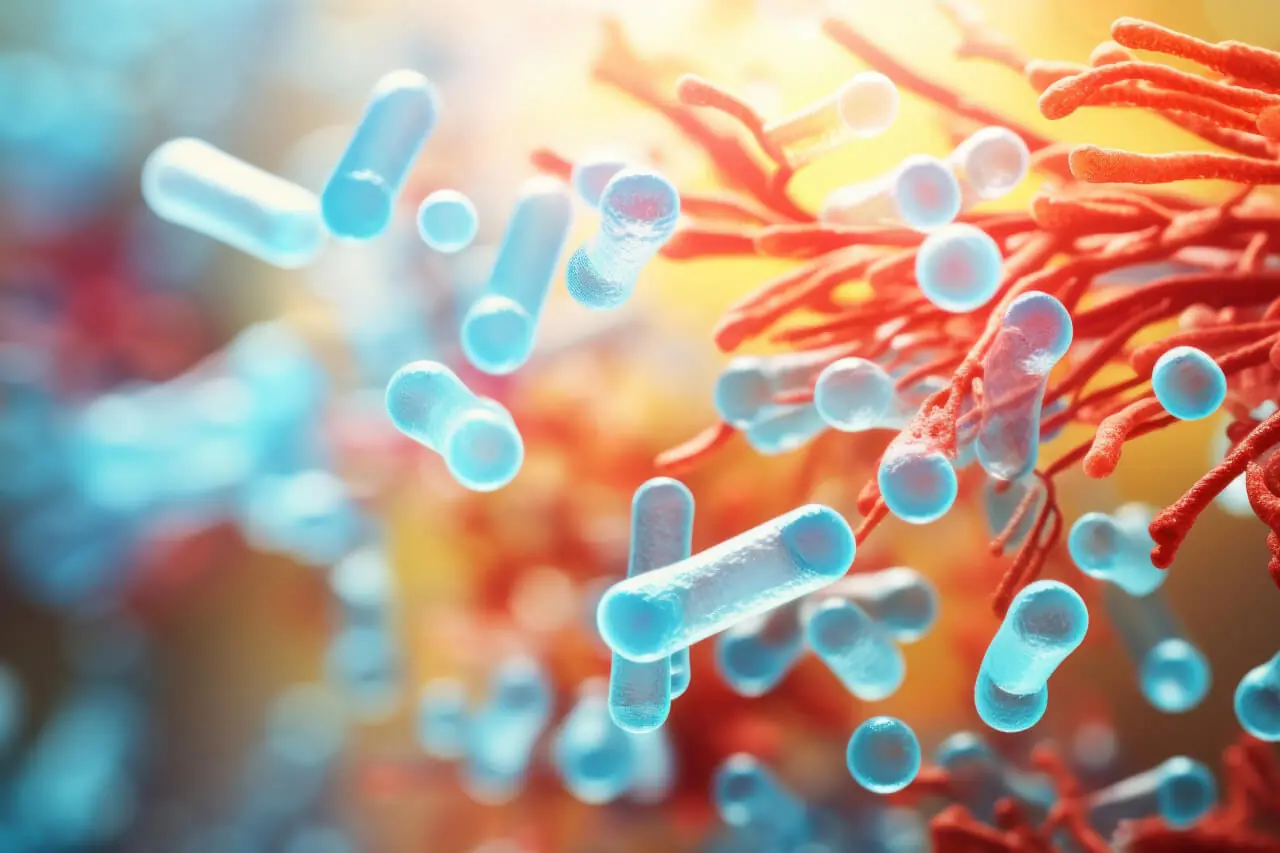Probiotics for anxiety and depression are live microorganisms that can provide health benefits when consumed.
They are usually found in fermented foods, such as yogurt, kefir, sauerkraut, kimchi, and kombucha, or in supplements, such as capsules, powders, or liquids.
Probiotics can help balance the gut microbiome, which is the community of bacteria and other microbes that live in the digestive tract.
The gut microbiome plays a crucial role in many aspects of health, including digestion, immunity, metabolism, and mood.
In this article, we will explore what probiotics are, what are the need for probiotics, what are the symptoms and causes of anxiety and depression, and how to use probiotics for anxiety and depression.
What are Probiotics?
Probiotics are defined by the World Health Organization as “live microorganisms which when administered in adequate amounts confer a health benefit on the host”.
Probiotics for anxiety and depression can be classified into different groups based on their genus, species, and strain.
Some of the most common and well-studied probiotics are:
Lactobacillus:
This is a group of bacteria that produce lactic acid and can help with lactose intolerance, diarrhea, irritable bowel syndrome, and vaginal infections.
Some examples of Lactobacillus strains are L. acidophilus, L. rhamnosus, L. casei, and L. plantarum.
Bifidobacterium
This is a group of bacteria that can help with constipation, ulcerative colitis, and allergic diseases.
Some examples of Bifidobacterium strains are B. bifidum, B. longum, B. breve, and B. animalis.
Saccharomyces boulardii
This is a type of yeast that can help with diarrhea, inflammatory bowel disease, and Helicobacter pylori infection.
Streptococcus thermophilus: This is a type of bacteria that can help with lactose intolerance, diarrhea, and oral health.
Enterococcus faecium
This is a type of bacteria that can help with diarrhea and immune function.
The effects of probiotics depend on the type, dose, and duration of use, as well as the individual’s health condition and gut microbiome composition.
Therefore, it is important to consult a doctor before taking any probiotic supplements, especially if you have a medical condition or are taking any medications.
What is the Need for Probiotics?
The need for Probiotics for anxiety and depression arises from the fact that the gut microbiome can be disrupted by various factors, such as:
Antibiotics
Antibiotics are drugs that can kill or inhibit the growth of bacteria that cause infections.
However, they can also affect the beneficial bacteria in the gut, leading to an imbalance in the microbiome.
This can result in side effects, such as diarrhea, bloating, gas, and yeast infections.
Probiotics can help restore the gut microbiome and prevent or treat these side effects.
Diet
Diet can influence the gut microbiome by providing different types of nutrients and fibers that can feed or inhibit the growth of certain bacteria.
A diet that is high in processed foods, sugars, fats, and animal products can reduce the diversity and abundance of beneficial bacteria.
While a diet that is rich in fruits, vegetables, whole grains, and fermented foods can increase them.
Probiotics can help supplement the diet and enhance the gut microbiome.
Stress
Stress can affect the gut microbiome by altering the gut-brain axis, which is the bidirectional communication between the nervous system and the digestive system.
Stress can trigger the release of hormones, such as cortisol and adrenaline, that can change the gut motility, permeability, and immunity.
This can lead to inflammation, dysbiosis, and leaky gut syndrome, which are associated with various health problems, such as irritable bowel syndrome, inflammatory bowel disease, and obesity.
Probiotics can help modulate the gut-brain axis and reduce the negative effects of stress on the gut microbiome.
Age
Age can affect the gut microbiome by causing changes in the physiology, immunity, and lifestyle of the individual.
As people age, they tend to have a lower diversity and abundance of beneficial bacteria, especially Bifidobacterium, which can result in increased susceptibility to infections, inflammation, and chronic diseases.
Probiotics can help maintain the gut microbiome and prevent or delay the age-related decline in health.
What are the Symptoms and Causes of Anxiety and Depression?
Anxiety and depression are two common mental disorders that affect millions of people worldwide.
Anxiety is characterized by excessive fear, nervousness, or worry that interferes with daily functioning.
Depression is characterized by persistent sadness, loss of interest, or hopelessness that affects the mood, energy, and motivation.
The symptoms of anxiety and depression can vary from person to person, but some of the most common ones are:
Physical symptoms
These include palpitations, chest pain, shortness of breath, sweating, trembling, nausea, dizziness, insomnia, fatigue, headaches, and muscle tension.
Cognitive symptoms
These include negative thoughts, low self-esteem, poor concentration, memory problems, difficulty making decisions, and suicidal ideation.
Behavioral symptoms
These include avoidance, procrastination, isolation, withdrawal, irritability, aggression, and substance abuse.
Emotional symptoms
These include fear, panic, anxiety, sadness, despair, guilt, shame, anger, and numbness.
The causes of anxiety and depression are complex and multifactorial, involving genetic, biological, psychological, and environmental factors.
Some of the possible causes are:
Genetic factors
Anxiety and depression can run in families, suggesting a hereditary component.
Certain genes can influence the levels and functions of neurotransmitters, such as serotonin, dopamine, and norepinephrine, which are involved in mood regulation and stress response.
Biological factors
Anxiety and depression can be associated with hormonal imbalances, such as thyroid disorders, adrenal disorders, or menopause.
They can also be linked to chronic diseases, such as diabetes, heart disease, or cancer.
Moreover, they can be related to the gut microbiome, which can affect the production and metabolism of neurotransmitters and modulate the immune and inflammatory responses.
Psychological factors
Anxiety and depression can be influenced by personality traits, such as neuroticism, perfectionism, or low self-esteem.
They can also be triggered by traumatic events, such as abuse, violence, or loss.
Furthermore, they can be maintained by cognitive distortions, such as catastrophizing, overgeneralizing, or personalizing.
Environmental factors
Anxiety and depression can be affected by social factors, such as family, friends, work, or school.
They can also be impacted by lifestyle factors, such as diet, exercise, sleep, or stress.
Additionally, they can be exacerbated by substance use, such as alcohol, nicotine, or drugs.
How to use Probiotics for Anxiety and Depression
Probiotics can be used as a complementary or alternative therapy for anxiety and depression, as they can modulate the gut-brain axis and influence mood and behavior.
Probiotics can have beneficial effects on anxiety and depression by:
Producing neurotransmitters
Probiotics can produce and release neurotransmitters, such as serotonin, dopamine, and gamma-aminobutyric acid (GABA), which are involved in mood regulation and stress response.
For example, Lactobacillus and Bifidobacterium can produce serotonin, which can enhance the mood and reduce anxiety.
Saccharomyces boulardii can produce dopamine, which can increase motivation and pleasure.
Lactobacillus rhamnosus can produce GABA, which can induce relaxation and calmness.
Regulating inflammation
Probiotics can regulate the immune and inflammatory responses, which can affect the brain function and mood.
Probiotics can reduce the levels of pro-inflammatory cytokines, such as interleukin-6 (IL-6) and tumor necrosis factor-alpha (TNF-alpha), which can cause neuroinflammation and neurodegeneration.
Probiotics can also increase the levels of anti-inflammatory cytokines, such as interleukin-10 (IL-10) and transforming growth factor-beta (TGF-beta), which can protect the brain and promote neurogenesis.
Improving the intestinal barrier
Probiotics can improve the intestinal barrier, which can prevent the leakage of toxins, pathogens, and antigens into the bloodstream and the brain.
Probiotics can enhance the production of mucin, which can coat the intestinal lining and prevent the adhesion of harmful bacteria.
Probiotics can also increase the expression of tight junction proteins, such as occludin and zonulin, which can seal the gaps between the intestinal cells and prevent the permeability.
Modifying the behavior
Probiotics for anxiety and depression can modify the behavior by altering the activity and connectivity of the brain regions that are involved in emotion, cognition, and stress.
Probiotics for anxiety and depression can affect the hypothalamic-pituitary-adrenal (HPA) axis, which is the main stress response system in the body.
Probiotics can reduce the levels of cortisol, which is the stress hormone, and increase the levels of corticotropin-releasing factor (CRF), which is the stress regulator.
Probiotics can also affect the limbic system, which is the emotional center of the brain.
It can also affect the limbic system, which is the emotional center of the brain.
Probiotics for anxiety and depression can increase the activity and connectivity of the amygdala, which is involved in fear and anxiety, and the hippocampus, which is involved in memory and learning.
Probiotics can also decrease the activity and connectivity of the prefrontal cortex, which is involved in executive functions and decision making.
To use probiotics for anxiety and depression, it is important to choose the right type, dose, and duration of probiotics, as well as the appropriate delivery method. Some of the factors to consider are:
Type of probiotics
Different probiotics have different effects on the gut-brain axis and the mood and behavior.
Therefore, it is important to choose the probiotics that have been shown to have beneficial effects on anxiety and depression in clinical trials.
Some of the probiotics that have been studied for anxiety and depression are Lactobacillus rhamnosus GG, Lactobacillus casei Shirota, Bifidobacterium longum NCC3001, and Bifidobacterium infantis 35624.
However, more research is needed to determine the optimal strains and combinations of probiotics for anxiety and depression.
Dose of probiotics
The dose of probiotics refers to the number of live microorganisms that are consumed per day.
The dose of probiotics can vary depending on the type, quality, and formulation of the Probiotics for anxiety and depression , as well as the individual’s health condition and gut microbiome composition.
The general recommendation is to take at least 10 billion colony forming units (CFU) of Probiotics for anxiety and depression per day, but higher doses may be needed for some people or conditions.
It is advisable to consult a doctor before taking any probiotic supplements, as they may have some side effects or interactions with other medications.
Duration of probiotics
The duration of probiotics refers to the length of time that the Probiotics for anxiety and depression are consumed.
The duration of probiotics can depend on the type, dose, and formulation of the Probiotics for anxiety and depression, as well as the individual’s health condition and gut microbiome composition.
The general recommendation is to take Probiotics for anxiety and depression for at least 4 to 8 weeks, but longer periods may be needed for some people or conditions.
It is advisable to consult a doctor before taking any probiotic supplements, as they may have some side effects or interactions with other medications.
Delivery method of probiotics
The delivery method of probiotics refers to the way that the probiotics are administered to the body.
The delivery method of probiotics can affect the viability, stability, and efficacy of the Probiotics for anxiety and depression, as they have to survive the harsh conditions of the stomach and the intestines.
The most common delivery methods of probiotics
Fermented foods
Fermented foods are foods that have been processed by the action of microorganisms, such as bacteria or yeast.
Fermented foods can provide a natural source of probiotics, as well as other beneficial substances, such as vitamins, minerals, enzymes, and antioxidants.
Some examples of fermented foods that contain probiotics are yogurt, kefir, sauerkraut, kimchi, and kombucha.
However, not all fermented foods contain probiotics, as some of them may be pasteurized, filtered, or heated, which can kill or remove the live microorganisms.
Therefore, it is important to check the label and look for the words “live and active cultures” or “contains probiotics” when choosing fermented foods.
Supplements
Supplements are products that contain concentrated or isolated forms of Probiotics for anxiety and depression, such as capsules, powders, or liquids.
Supplements can provide a convenient and standardized way of consuming probiotics, as they can ensure a consistent and adequate dose of Probiotics for anxiety and depression.
However, not all supplements are created equal, as some of them may have low quality, potency, or purity, which can affect the viability, stability, and efficacy of the probiotics.
Therefore, it is important to check the label and look for the following information when choosing supplements.
Name of the probiotics, The name of the probiotics should include the genus, species, and strain of the microorganisms, such as Lactobacillus rhamnosus GG or Bifidobacterium longum NCC3001.
This can help identify the specific effects and benefits of the probiotics, as well as the possible side effects or interactions with other medications.
Number of the probiotics
The number of the probiotics should indicate the amount of live microorganisms that are present in each serving or dose of the supplement, usually expressed in CFU.
This can help determine the optimal dose and duration of the probiotics, as well as the possible side effects or interactions with other medications.
Expiration date of the probiotics
The expiration date of the probiotics should indicate the date until which the probiotics are guaranteed to remain viable and effective, usually expressed in month and year.
This can help ensure the quality and potency of the probiotics, as well as the possible side effects or interactions with other medications.
Storage conditions of the Probiotics for anxiety and depression
The storage conditions of the probiotics should indicate the optimal temperature and humidity that the probiotics should be kept at, usually expressed in degrees Celsius or Fahrenheit and percentage.
This can help preserve the viability and stability of the probiotics, as well as the possible side effects or interactions with other medications.
Conclusion
Probiotics for anxiety and depression are live microorganisms that can provide health benefits when consumed. They can help balance the gut microbiome, which is the community of bacteria and other microbes that live in the digestive tract.
The gut microbiome plays a crucial role in many aspects of health, including mood and behavior.
Probiotics for anxiety and depression can help modulate the gut-brain axis and influence the symptoms and causes by producing neurotransmitters, regulating inflammation, improving the intestinal barrier, and modifying the behavior.
To use probiotics for anxiety and depression, it is important to choose the right type, dose, and duration of probiotics, as well as the appropriate delivery method.
Probiotics for anxiety and depression can be obtained from fermented foods or supplements, but it is advisable to consult a doctor before taking any probiotic supplements, especially if you have a medical condition or are taking any medications.
Probiotics for anxiety and depression can be used as a complementary or alternative therapy for anxiety and depression, but they are not a substitute for professional help.
If you are suffering from anxiety or depression, please seek the advice and support of a qualified mental health professional.
FAQs
Can probiotics really help with anxiety and depression?
Yes, there is growing evidence suggesting a connection between gut health and mental well-being.
Probiotics for anxiety and depression , by promoting a healthy balance of gut bacteria, may positively impact the brain-gut axis, potentially influencing mood and emotional health.
How do probiotics work to alleviate anxiety and depression symptoms?
Probiotics for anxiety and depression contribute to a healthy gut microbiome, influencing the production of neurotransmitters and anti-inflammatory substances.
This interaction may modulate the communication between the gut and the brain, playing a role in mood regulation and reducing symptoms of anxiety and depression.
What specific strains of probiotics are beneficial for mental health?
Certain strains, such as Lactobacillus and Bifidobacterium, have shown promise in promoting mental well-being.
Research indicates that these strains may have a positive impact on mood and may help alleviate symptoms associated with anxiety and depression.
Can probiotics be used as a standalone treatment for anxiety and depression?
While probiotics show promise in supporting mental health, they are not meant to replace conventional treatments.
Probiotics can be considered as part of a holistic approach that includes proper medical care, a healthy diet, regular exercise, and other lifestyle factors to address anxiety and depression comprehensively.
How long does it take to notice the effects of probiotics for anxiety and depression?
Individual responses vary, and the time it takes to observe benefits may differ.
Some individuals may experience improvements in mood relatively quickly, while others may require more time.
Consistency in Probiotics for anxiety and depression use, along with lifestyle factors, can influence the timeline for seeing potential positive effects.
Are there any potential side effects or considerations when using probiotics for mental health?
In general, Probiotics for anxiety and depression are considered safe for most people.
However, some individuals may experience mild gastrointestinal symptoms initially.
It’s essential to choose high-quality probiotic supplements, follow recommended dosages, and consult with a healthcare professional, especially for those with pre-existing health conditions or those taking other medications.





